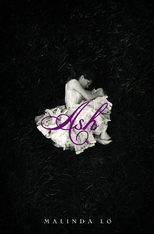
Ash
by Malinda Lo
William C. Morris Debut Award Finalist 2010
A retelling of the fairy tale “Cinderella,” Ash follows the titular character (short for Aisling) in her quest for belonging after the death of both her parents. Treated as a servant by her stepmother due to her father’s outstanding debts, her only solace lies in reading the familiar fairy tales of her childhood. Longing to escape to the fairy world, she is eventually approached by the fairy Sidhean who offers her the opportunity to make her dream a reality. However, she also meets and befriends the king’s huntress, Kaisa, and must choose between the two disparate worlds.
Labeled a lesbian Cinderella story by many reviewers, I expect that a number of conservative parents will be upset by their teens reading this book. It is for that reason that I would like to clarify that there is nothing explicit regarding the relationship between Kaisa and Ash. It is a simple, old-fashioned romance, and I imagine that if the two persons involved were of the opposite sex, no one would think anything of it.
Written with clear, simple prose reminiscent of the fairy tales that directly inspired it, Lo’s debut novel is an enjoyable, albeit brief read. The world in which the novel takes place is fully developed, complete with its own holidays and fairy stories. My only complaint with the book is that the ending was much too neat and predictable. I had hoped that Kaisa would need to sacrifice something in order to prevent Sidhean from taking Ash to live with him in the fairy realm, but no such event occurred. With the vast number of stories relating various quests into the fairy realm to retrieve those taken by the fairies, Sidhean’s willingness to remove his claim upon Ash seemed to be a bit out of character.
While I had my qualms with the work, I am greatly looking forward to Lo's next novel, which is to take place in the same world, albeit a century or two before Ash. I would certainly recommend this to any fans of shoujo ai or of fairy tale retellings.
Grade: B+
*****
 The Book Thief
The Book Thiefby Markus Zusak
Michael L. Printz Honor Book 2007
When I first started reading this beautifully melancholy book, I was put off considerably by the writing style. The narrator of this particular WWII story is Death himself, but Zusak portrays him as being far more human than the typical scythe-wielding reaper. He has an annoying tendency to stop in the middle of the exposition to focus on one particular word or event, which is always written in bold face. It reminded me quite a bit of Alvy in Annie Hall and his frequent destruction of the fourth wall. And, while it might be perfectly acceptable to have such a narrator in a Woody Allen film, it didn’t suit the mood of this novel at all. It really felt to me like Zusak was somehow trying to be hip, or to connect with his teenage audience.
Literacy and the power of words figure prominently in the work, and not merely because Liesel, the novel’s protagonist, learns to read via the books she steals (or more often, rescues). What amounts to one of the most beautiful scenes in the book occurs when Max, the Jew hiding in Liesel’s basement, presents her with a picture book entitled “The Word Shaker,” in which all the hateful rhetoric of the Fuhrer and the Nazi party is embodied in the form of a forest. One day, a girl lets a single teardrop fall for a man, later planting the seed of friendship that had formed from it. Though the two tend to the tree until it is one of the tallest in the forest, it ultimately falls to the axes of hate and discrimination. Even lovelier than the symbolism of the story itself is what Max uses to write the story: a copy of Mein Kampf that had its pages painted white.
Instead of presenting a tale specifically about the Holocaust and its victims, Zusak instead chose to focus on the lives of everyday German civilians and how the war affected their way of life. Through incidents involving various characters, readers see what became of those who refused to join the Nazi party or for their children to be sent to special academies. I greatly appreciated the author’s efforts to create sympathetic characters in an environment and era that, all too often, are demonized by the US; it is important to remember that not all Germans were the enemy and that many of them were simply trying to go about their lives as normal.
Ultimately, though I disagreed with a few of Zusak’s choices regarding style, I highly recommend this book and can easily see why it has won so much praise. I grew to be very attached to the characters, and as I expect you all to be, as well, I warn you to be prepared for quite the tragic end.
Grade: A